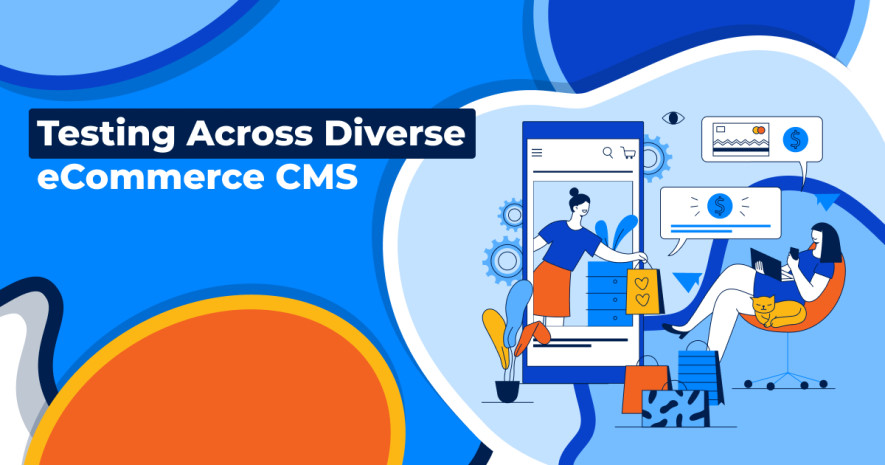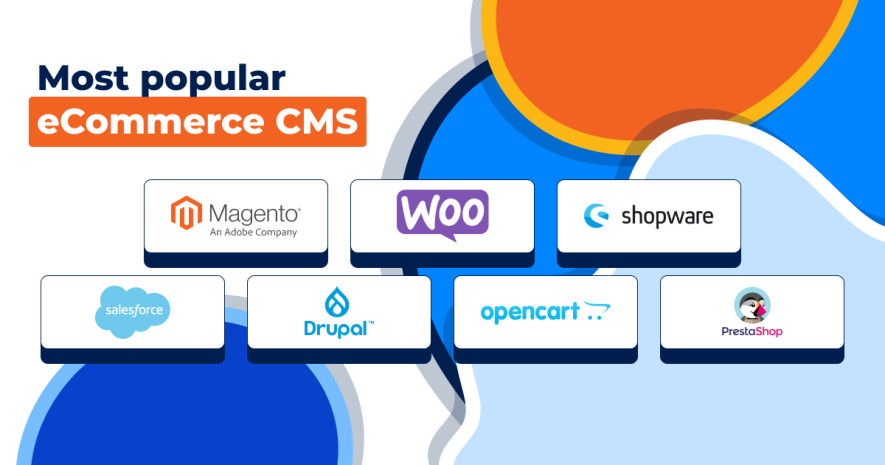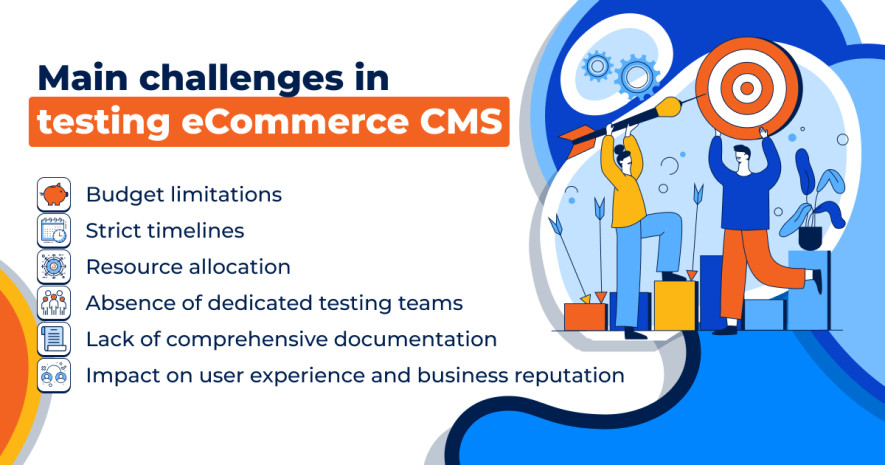- QATestLab Blog >
- QA Basics >
- Types of Software Testing >
- E-commerce Testing >
- Testing Across Diverse eCommerce CMS: Importance, Challenges, and Solutions
Testing Across Diverse eCommerce CMS: Importance, Challenges, and Solutions

In the digital transformation era, eCommerce has swiftly transitioned from a luxury to an absolute necessity. A recent survey indicates that 30% of online store owners have utilized a Content Management System (CMS) to boost their content marketing strategies, underscoring that a robust CMS and a meticulous testing strategy often form the backbone of every successful online store.
The resilience of your eCommerce CMS and the efficiency of your testing strategy can significantly influence your capacity to compete and thrive in this highly competitive landscape. However, despite detailed design and development, the challenge of ensuring a consistent, high-quality user experience across various devices, screen sizes, and network conditions continues to persist. Even a single glitch can prompt cart abandonment, tarnish your brand’s reputation, and lead to a loss of revenue.
As eCommerce becomes increasingly important, this article explores the complexities involved in evaluating different CMS solutions in the eCommerce space. Regardless of whether you’re a seasoned eCommerce business or a startup stepping into the digital marketplace, gaining a comprehensive understanding of various aspects involved in testing CMS-based eCommerce platforms will assist in ensuring your platform delivers the seamless, top-notch user experience your customers anticipate.
What Is an eCommerce CMS, and Why Is Testing It So Crucial?
An eCommerce CMS, short for Content Management System, is a dedicated software solution designed for online retailers. These platforms are meticulously crafted to aid in the creation and management of online stores, marketplaces, and product directories. They come equipped with a wide array of tools to manage inventory, strategize marketing campaigns, and in some instances, handle order fulfillment.
Often, eCommerce CMSs are provided as SaaS (Software as a Service) solutions, suggesting their accessibility via the web and eliminating the need for physical installations. Some of the most popular CMSs for eCommerce include Magento, Woocommerce, Shopware, Salesforce, Drupal, Prestashop, and Opencart. These leading eCommerce platforms are renowned for delivering top-notch user experiences and ease of operation. They also integrate solid security measures and scalability features, ensuring your business can grow and succeed, regardless of its size.

The process of eCommerce CMS testing plays a pivotal role in ensuring the performance, security, and user experience of your online store. The significance of eCommerce CMS testing is immense, akin to the safety checks before a roller coaster ride, ensuring a seamless and secure experience. In the eCommerce realm, this ‘ride’ is synonymous with your customer’s shopping journey. The testing phase helps identify and rectify potential glitches that could disrupt seamless customer experiences or endanger data security.
Since eCommerce platforms handle sensitive customer data and conduct financial transactions, testing confirms that all components work in harmony, ensuring a secure, reliable, and engaging customer experience. Without thorough testing, your customers could face a myriad of issues, ranging from minor setbacks like slow page loading to severe security breaches.
For more insight into eCommerce CMSs, their impact on your business, and the necessity of CMS testing, refer to our article.
How to Overcome CMS Testing Challenges: A Path Forward
ECommerce CMS testing can be fraught with challenges, often magnified by budget limitations and strict timelines. Small-scale businesses, in particular, might find it hard to allocate ample resources for comprehensive testing or succumb to the pressures of a swift time-to-market. Further, the absence of dedicated testing teams and comprehensive documentation could make spotting and addressing issues challenging, which might compromise the user experience and impact the business’s standing. These barriers underscore the necessity for a strategic, effective approach to eCommerce CMS testing.

At QATestLab, we acknowledge the critical importance of seamless functioning in the eCommerce domain. Here is our primary expertise at QATestLab, set up to guide your business toward success by efficiently resolving these pain points.
- Our transparent, adjustable pricing model allows clients to anticipate costs upfront and can be customized based on the number of devices or browsers used, thus aligning with the client’s budget.
- Capitalizing on our large team of specialists and our in-house training center, we can undertake significant volumes of work within strict deadlines. This rapid response capability ensures your project stays on course without compromising the quality of testing.
For example, consider our work with a lingerie online store. Operating across the USA and Europe, a multinational firm runs unique websites for each country, each tailored and adapted to local nuances. Unfortunately, the company has received negative reviews concerning the purchasing process, causing a detrimental impact on both its revenue and reputation. To solve all the issues, our testing team identified and rectified bugs and successfully deployed new product versions. What was once a significant issue transformed into an asset, enhancing user experience and boosting customer satisfaction.

- Despite the industry’s general reliance on tech documentation, our team’s expertise and experience allow us to operate efficiently, even without it.
- Moreover, we offer services to update or create your test documentation, blending seamlessly with your existing processes.
Consider our functional testing work for an eCommerce business that was keen on automating all User Interface (UI) testing processes for their web stores operating across different nations. Employing Cypress and JavaScript, we designed an extensive set of automated tests applicable to all their global websites, including testing for mobile browser view. Our experts carried out complete UI testing coverage, slashed the QA check duration from 8 to 2 hours, and enhanced test support.

Summing Up
With global online sales hitting an astronomical 5.7 trillion dollars in 2022 and forecasted to climb to around 8.1 trillion dollars by 2026, it’s clear that the eCommerce landscape is rapidly expanding. This growth intensifies the challenge for online stores — to stand out in an increasingly crowded market. Today’s clients seek more than temporary QA fixes; they aim to enhance their online store, ensuring a seamless and exceptional customer experience.
In this context, forging a partnership with a reliable QA provider is crucial for maintaining the high standards that your business requires. That’s where we come in. We focus on addressing your quality concerns, leaving you free to dedicate your efforts to your central business priorities.
Our satisfied clients and successful case studies stand as a testament to our proficiency and the measurable benefits of our services.
Are you prepared to bolster your online store with robust QA and distinguish yourself from the competition? Contact us, and let’s discuss how we can augment your service with quality testing from a trustworthy provider. With us, quality isn’t just an expectation — it’s a rule.
Learn more from QATestLab
Related Posts:
- Is Your E-commerce Ready for Black Friday & Cyber Monday? Let’s Check!
- A Brief Guide to E-commerce Testing Process
- Real Cases with E-commerce Platforms Where Software Testing Made a Difference
About Article Author
view more articles
has more than 2-year experience in blogging and copywriting, copyediting and proofreading of web content.
View More Articles






No Comments Yet!
You can be the one to start a conversation.